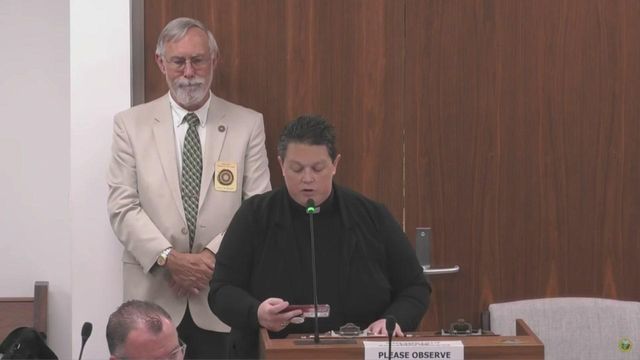Duke Chopper Crashes in Burlington Neighborhood, Pilot Killed

A LifeFlight helicopter fromDuke University Medical Centercrashed in a Burlington neighborhood Monday night, killing its pilot, the only person on board.
LifeFlight II went down just before midnight in an upscale subdivision, missing all houses. No one on the ground was injured.
The pilot is identified as John Holland, 39, of Hillsborough. He was an employee of Corporate Jets, Inc., of Pittsburgh, which operated and maintained the aircraft for Duke. Pilot Noticed Problem, Told Crew To Take Patient By AmbulanceThe 7-year-oldEurocopterTwinstar helicopter had gone to theAlamance Regional Medical Centerin Burlington to pick up a patient.
At around 10:30 p.m., a warning light indicating a problem with transmission oil pressure came on.
When the helicopter landed at the Burlington hospital, Holland instructed the rest of the crew to take the patient by ambulance to Duke. He then called a mechanic from Durham to look at the helicopter.
After having the problem checked, Holland took off from the hospital at 11:49 p.m. Monday. The helicopter went down a few minutes later, a little over a mile from the hospital.
Pilots say problems with the transmission oil pressure can be serious. FAA records indicate that the Eurocopter Twinstar rarely, if ever, has serious problems with transmission oil pressure. Warning lights also give false information sometimes. Neighbor Hears Bang, Hissing Noise Before CrashOne man was falling asleep when he heard something that sounded like a gunshot. He says he then heard a hissing sound, similar to noise from hot-air balloons.
He says his wife looked outside and saw the helicopter on fire in the nearby field.
A piece of the tail boom hung in a tree as residents gathered Tuesday morning to look over the burned wreckage. They credit the pilot for missing the houses.
"With all these houses here, it's a miracle that he landed in this empty field," says homeowner Joan Sposato.
The helicopter crashed just yards from Bryan Roming's house.
"It's just incredible. [The pilot] is a hero. I can honestly say that because of what he did, he saved my family's life," Roming says. Federal Officials Set to Begin InvestigationThe crash investigation will be left to theNational Transportation Safety Boardand theFederal Aviation Administration.
Crews began moving wreckage from the crash scene to garages Tuesday afternoon. Investigators say they probably will not have a definitive cause of the crash for another year. Fellow Workers and Friends Remember Late PilotPilot John Holland had flown at Duke for more than five years. He was director of LifeFlight's safety program.
"I know that he would not have taken off on that flight if he felt it was unsafe," said Edward Eroe, LifeFlight's assistant operating officer.
Holland flew at least 18 rescue missions as a Marine pilot, stationed at Cherry Point Marine Corps Air Station in Havelock.
"John used all that skill in some heroic efforts to avoid all homes and lives when he set the helicopter down," says Larry Pietropaulo of Corporate Jets, Incorporated.
Friends and co-workers gathered Tuesday at the Duke University Medical Center helipad to grieve and remember Holland. Many of them, as well as some of the people Holland transported over the years, left flowers and notes at the fence around the landing area.
Many also went to Holland's house in Hillsborough to be with his family Tuesday. First Fatal Crash in Well-Maintained LifeFlight ProgramMonday's crash was the first fatal accident in the 15-year history of Duke's LifeFlight air ambulance service. The LifeFlight program had seen only two other incidents, both with separate, different aircraft.
A blown engine caused a LifeFlight helicopter to crash in 1986, causing no serious injuries. An engine fire on another LifeFlight aircraft prompted an emergency landing at Fort Bragg in 1992. No one was injured.
Duke operates two helicopters, transporting approximately 1,300 critically ill patients every year.
Sources familiar with the program say that the same engineers have been meticulously maintaining the aircraft for many years.
Duke's other helicopter, LifeFlight I, has been temporarily grounded. Hospital officials hope to have it back in the air sometime Wednesday.
Along with help from other hospitals, Duke hopes to have a second helicopter in service soon, preventing a major interruption in service. andLen BesthoffandJohn Cox









